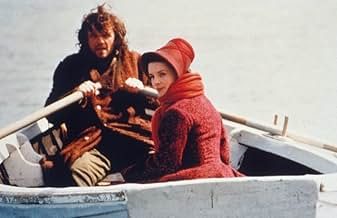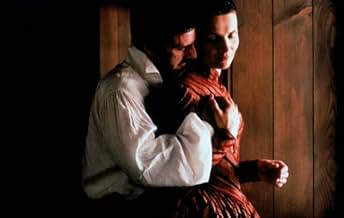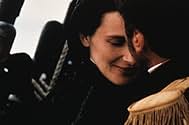IMDb रेटिंग
7.1/10
5.8 हज़ार
आपकी रेटिंग
अपनी भाषा में प्लॉट जोड़ेंIn a small French colony, a drunken man kills someone. While a guillotine is being shipped in, he changes, becoming a good and popular man.In a small French colony, a drunken man kills someone. While a guillotine is being shipped in, he changes, becoming a good and popular man.In a small French colony, a drunken man kills someone. While a guillotine is being shipped in, he changes, becoming a good and popular man.
- निर्देशक
- लेखक
- स्टार
- पुरस्कार
- 3 जीत और कुल 9 नामांकन
फ़ीचर्ड समीक्षाएं
I was most impressed with the visual language of this movie that does not waste words to show emotions. The tensions are well reflected in the play of the actors, whose gestures, shrugs and smiles say more than a thousand lines.
Another interesting feature of the movie is that it does not follow the easy path of romance that is "expected" by the public. In turn, it exposes a world which is cruel, unfair, where justice is determined by personal interests and where those who fight the system are seen as mad and excluded from the "high society".
It is a movie about the determination to fight for something one believes in!
Another interesting feature of the movie is that it does not follow the easy path of romance that is "expected" by the public. In turn, it exposes a world which is cruel, unfair, where justice is determined by personal interests and where those who fight the system are seen as mad and excluded from the "high society".
It is a movie about the determination to fight for something one believes in!
The actions of two men on a drunken spree turns out to be fatal for the man who is being harassed because he dies as a consequence of a fight with his two tormentors. Both men are apprehended and condemned to die as punishment for their actions. The way to die is beheading by guillotine, or "the widow" in the vernacular.
Thus begins this story that director Patrice Leconte directed, based on the screen play by Claude Faraldo. The story is set in the remote island of Saint Pierre, off the coast of Newfoundland. This is a hostile environment settled by the French. Saint Pierre boasts a lot of widows who have survived the rigors of the climate and the hard lives their husbands led.
Into this milieu we find a military captain and his wife. Both are Parisians and appear to be compassionate, at heart. When Neel, the surviving drunk is brought to be kept in a cell within the military quarters of the island, the wife, Madame La, takes an interest in the man. With her husband's consent, she asks for his help in tending a green house in the premises and other errands.
Neel and Madame La are at simple view, just opposites. The kindness Neel sees in her, transforms him. Madame La even goes to help him learn to read. All these actions don't sit well with the rest of the inhabitants and the people in the government who demand a guillotine is sent over and have him execute the prisoner.
The film works because the brilliant performance of Juliette Binoche, who as Madame La, makes her mark in the picture. Her compassion for Neel is genuine; in her heart she believes this man, a product of the environment in which he was born, shows qualities that no one has seen in him.
Emir Kusturica, a noted film director himself, is also one of the assets of the movie. Mr. Kusturica is a large man with unkempt looks, who is totally believable as Neel. His interaction with Madame La turns from gratitude into a noble love that is not meant to be.
The other principal is Daniel Auteuil who is perfect as the captain, the husband of Madame La, who is outraged by what he perceives to be the wrong punishment for the accused Neel. In spite of the menacing presence of Neel next to his wife, he trusts her as he knows her kind heart belongs to him only.
"La veuve de Saint Pierre" is a great movie that will satisfy viewers in search of a different story. Patrice Leconte has directed with panache as he takes us to see the beauty of Saint Pierre, something that is so bleak, yet it's a place that has a magnetic attraction as we watch the film unfold.
Thus begins this story that director Patrice Leconte directed, based on the screen play by Claude Faraldo. The story is set in the remote island of Saint Pierre, off the coast of Newfoundland. This is a hostile environment settled by the French. Saint Pierre boasts a lot of widows who have survived the rigors of the climate and the hard lives their husbands led.
Into this milieu we find a military captain and his wife. Both are Parisians and appear to be compassionate, at heart. When Neel, the surviving drunk is brought to be kept in a cell within the military quarters of the island, the wife, Madame La, takes an interest in the man. With her husband's consent, she asks for his help in tending a green house in the premises and other errands.
Neel and Madame La are at simple view, just opposites. The kindness Neel sees in her, transforms him. Madame La even goes to help him learn to read. All these actions don't sit well with the rest of the inhabitants and the people in the government who demand a guillotine is sent over and have him execute the prisoner.
The film works because the brilliant performance of Juliette Binoche, who as Madame La, makes her mark in the picture. Her compassion for Neel is genuine; in her heart she believes this man, a product of the environment in which he was born, shows qualities that no one has seen in him.
Emir Kusturica, a noted film director himself, is also one of the assets of the movie. Mr. Kusturica is a large man with unkempt looks, who is totally believable as Neel. His interaction with Madame La turns from gratitude into a noble love that is not meant to be.
The other principal is Daniel Auteuil who is perfect as the captain, the husband of Madame La, who is outraged by what he perceives to be the wrong punishment for the accused Neel. In spite of the menacing presence of Neel next to his wife, he trusts her as he knows her kind heart belongs to him only.
"La veuve de Saint Pierre" is a great movie that will satisfy viewers in search of a different story. Patrice Leconte has directed with panache as he takes us to see the beauty of Saint Pierre, something that is so bleak, yet it's a place that has a magnetic attraction as we watch the film unfold.
8=G=
As the best of French cinema does so adroitly, "The Window of Saint-Pierre" tells most of it's story laconically with knowing looks and subtle behaviors while the story it tells is a relentlessly plodding drama of unspoken words and the emotions they evoke. "Widow..." is more about integrity, honor, love, and other intangibles than it is about its relatively simple storyline and the characters involved. A beautifully crafted somber film, "Widow..." is recommended for mature audiences because a measure of maturation is required to appreciate all this austere film has to offer.
I have always been a Patrice Leconte devotee. His career in which incoherence and eclecticism get on well together (perhaps that's why he's often slated by French critics) is one of the most fruitful you could dream of, even if French mainstream public often associates his name with "les Bronzés" (1978), a commercial hit which put him on the map as well as the actors, the famous troupe of the Splendid and tends to overshadow the rest of his prolific career which spawned treasures like "Tandem" (1987), "Monsieur Hire" (1989) or "Le Mari De la Coiffeuse" (1990).
This vehicle "La Veuve De Saint Pierre" (2000) was originally to be directed by another veteran of French cinema Alain Corneau (who sadly shot the insipid "Prince Du Pacifique" that year, perhaps the nadir of his career) but he turned down the role due to disputes with the producers. So, Patrice Leconte inherited the project. His choice was motivated by the desire to work with one of the two main roles, Juliette Binoche (he had teamed up with Daniel Auteuil the previous year for "La Fille Sur Le Pont, 1999)
The title of the film has a double meaning: the "veuve" refers to Binoche after her husband's demise. The opening sequence presents her to us in her mourning garb (Leconte's work is served by lavish costumes). The audience knows that she is the "veuve" and will discover in the long flashback, how she has lost her husband. But a "veuve" is also a slang word for the sinister guillotine and it has a tongue-in-cheek connotation: Saint Pierre unlike France hasn't got a death instrument and must have one. All the time, the island is deprived of a guillotine, it remains a "veuve".
There are clearly two sides. On the one hand, the officers' who govern the island and are die-hards of the death sentence and on the other hand, the private triangle which encompasses Auteuil, Binoche and Kusturica. Between the two poles, the impending threat of the execution with the recurring images of the ship sailing across the Atlantic with on board the guillotine. The scenario eschews the tempting trap of the Manicheism and the officers aren't caricatures. As a matter of fact, one of the main thrusts of the film is to deride the leaders of the island who seek at all costs to keep the death sentence and their obstinacy is made ludicrous by the postpone of the sentence and the last words of the voice over contain grim details which give a slap to one of Doctor Guillotin's famous words: "a painless death is a progress for humanity". Moreover, they prove to be unscrupulous because when a new inhabitant settles on the island, they entrust him the role of the executioner without taking care of his opinion.
In the private triangle, madame La by guiding Neel on the way of redemption is full of condescension and solicitude but she's a complex character. Her reasons and motivations to redeem Neel are rather elusive even if she says (I don't remember the accurate cue): "I think human soul is unpredictable and can be able to become conscientious and intelligent. A little gratifying cue which should have been more construed and fleshed out and remains an inkling. Then, why would she encourage the sacrifice of such a devoted husband to try to save a convicted killer whereas it's doomed to failure? Is it a response to her husband's love? (If Auteuil sacrifices himself it's for love for his wife and respect for Neel). Certainly and if so, Leconte's piece of work is a novel and quirky approach on the relationship between husband and wife, a quite notable feat for an author who has seldom studied this topic in his filmography, except maybe in "Le Mari De La Coiffeuse".
Buoyed by a more than palatable cast with a special mention to Emir Kusturica who was a discerning choice because he could convey vulnerability and fragility to his persona of great strapping man, "La Veuve De Saint Pierre" may be derivative if we consider the theme of redemption and the thrust quoted in the fourth paragraph but its treatment is a far cry from Hollywood's formulaic conventions. How to rank it in Leconte's uneven but usually riveting filmography? It isn't on a par with his towering achievements but stands out as a more than palatable flick which however could have gained by being more deepened.
This vehicle "La Veuve De Saint Pierre" (2000) was originally to be directed by another veteran of French cinema Alain Corneau (who sadly shot the insipid "Prince Du Pacifique" that year, perhaps the nadir of his career) but he turned down the role due to disputes with the producers. So, Patrice Leconte inherited the project. His choice was motivated by the desire to work with one of the two main roles, Juliette Binoche (he had teamed up with Daniel Auteuil the previous year for "La Fille Sur Le Pont, 1999)
The title of the film has a double meaning: the "veuve" refers to Binoche after her husband's demise. The opening sequence presents her to us in her mourning garb (Leconte's work is served by lavish costumes). The audience knows that she is the "veuve" and will discover in the long flashback, how she has lost her husband. But a "veuve" is also a slang word for the sinister guillotine and it has a tongue-in-cheek connotation: Saint Pierre unlike France hasn't got a death instrument and must have one. All the time, the island is deprived of a guillotine, it remains a "veuve".
There are clearly two sides. On the one hand, the officers' who govern the island and are die-hards of the death sentence and on the other hand, the private triangle which encompasses Auteuil, Binoche and Kusturica. Between the two poles, the impending threat of the execution with the recurring images of the ship sailing across the Atlantic with on board the guillotine. The scenario eschews the tempting trap of the Manicheism and the officers aren't caricatures. As a matter of fact, one of the main thrusts of the film is to deride the leaders of the island who seek at all costs to keep the death sentence and their obstinacy is made ludicrous by the postpone of the sentence and the last words of the voice over contain grim details which give a slap to one of Doctor Guillotin's famous words: "a painless death is a progress for humanity". Moreover, they prove to be unscrupulous because when a new inhabitant settles on the island, they entrust him the role of the executioner without taking care of his opinion.
In the private triangle, madame La by guiding Neel on the way of redemption is full of condescension and solicitude but she's a complex character. Her reasons and motivations to redeem Neel are rather elusive even if she says (I don't remember the accurate cue): "I think human soul is unpredictable and can be able to become conscientious and intelligent. A little gratifying cue which should have been more construed and fleshed out and remains an inkling. Then, why would she encourage the sacrifice of such a devoted husband to try to save a convicted killer whereas it's doomed to failure? Is it a response to her husband's love? (If Auteuil sacrifices himself it's for love for his wife and respect for Neel). Certainly and if so, Leconte's piece of work is a novel and quirky approach on the relationship between husband and wife, a quite notable feat for an author who has seldom studied this topic in his filmography, except maybe in "Le Mari De La Coiffeuse".
Buoyed by a more than palatable cast with a special mention to Emir Kusturica who was a discerning choice because he could convey vulnerability and fragility to his persona of great strapping man, "La Veuve De Saint Pierre" may be derivative if we consider the theme of redemption and the thrust quoted in the fourth paragraph but its treatment is a far cry from Hollywood's formulaic conventions. How to rank it in Leconte's uneven but usually riveting filmography? It isn't on a par with his towering achievements but stands out as a more than palatable flick which however could have gained by being more deepened.
Juliette Binoche plays the wife of a military officer in a remote island town in 1849 Newfoundland who becomes devoted to the cause of saving the life of a condemned murderer. I was torn between admiring `The Widow of Saint-Pierre' for not taking the obvious route of having the captain's wife fall in love with her protege and run off with him (e.g., `Mrs. Soffel"), and a feeling of letdown that it was avoiding opportunities for more vivid and realistic drama. That there is an attraction between the two is made clear, especially in the highly charged, yet muted eroticism of the reading lesson scene. This film was based on a true story, but I couldn't help wondering if the actual killer was as saintly and devoid of guile as he seems in this movie. Among other things, he resists his attraction to his benefactress, although she would probably be more than willing to sleep with him, saves the life of a village woman whose house has slipped its moorings, and passes up an excellent chance to escape because he doesn't want to get anybody in trouble. He impregnates another woman, although it appears to be true love, and he then does the decent thing and marries her. One could accept that a criminal could be redeemed, but here he's a little too good to be true, reinforcing my suspicion that the characterization was meant more to reinforce the filmakers' anti-capital punishment stance than as a reflection of his actual personality. Daniel Auteil as her husband is stuck playing a character whose emotions remain largely inscrutable. The film would have us believe that there is no jealousy or resentment in the husband as his wife dedicates her life to rehabilitating and saving the condemned man under his charge. Ultimately, the captain gives up his own life for both of them, but I kept waiting for a significant sign that he had some inner conflict about doing so. After all, he is a career military officer sworn to uphold the law as it is. Who knew that underneath he was a bleeding heart liberal! This film is interesting and absorbing up to a point, but ultimately, it's also bland and overly complacent dramatically.
क्या आपको पता है
- ट्रिवियाThe film was to be completely filmed on the island of Saint-Pierre, but when the snow failed to arrive, the production had to move further north to Newfoundland for certain sequences.
- गूफ़When Neel is told he's strong enough to "ramer jusqu'au chez les Anglais", the English subtitles say "row over to Canada" rather than "row over to the English". This introduces an error: both the geography and the dialogue in other scenes make it clear that Newfoundland is meant, but Newfoundland wasn't part of Canada until 1949.
- कनेक्शनFeatured in The 58th Annual Golden Globe Awards 2001 (2001)
टॉप पसंद
रेटिंग देने के लिए साइन-इन करें और वैयक्तिकृत सुझावों के लिए वॉचलिस्ट करें
- How long is Widow of St. Pierre?Alexa द्वारा संचालित
विवरण
- रिलीज़ की तारीख़
- कंट्री ऑफ़ ओरिजिन
- आधिकारिक साइट
- भाषा
- इस रूप में भी जाना जाता है
- Widow of St. Pierre
- फ़िल्माने की जगहें
- Fortress of Louisbourg, Louisbourg, नोवा स्कोटिया, कनाडा(as Saint-Pierre)
- उत्पादन कंपनियां
- IMDbPro पर और कंपनी क्रेडिट देखें
बॉक्स ऑफ़िस
- बजट
- FRF 10,00,00,000(अनुमानित)
- US और कनाडा में सकल
- $31,93,889
- US और कनाडा में पहले सप्ताह में कुल कमाई
- $31,702
- 4 मार्च 2001
- दुनिया भर में सकल
- $71,93,889
- चलने की अवधि
- 1 घं 52 मि(112 min)
- रंग
- ध्वनि मिश्रण
- पक्ष अनुपात
- 2.35 : 1
इस पेज में योगदान दें
किसी बदलाव का सुझाव दें या अनुपलब्ध कॉन्टेंट जोड़ें
































